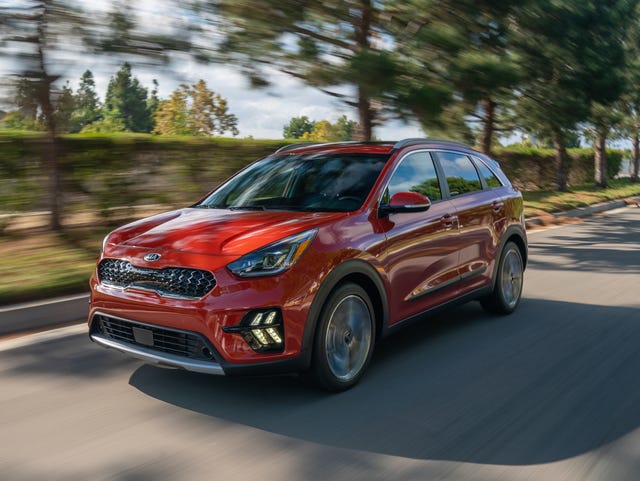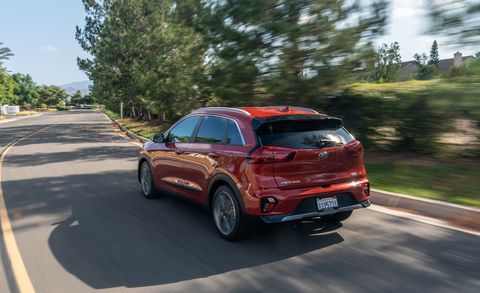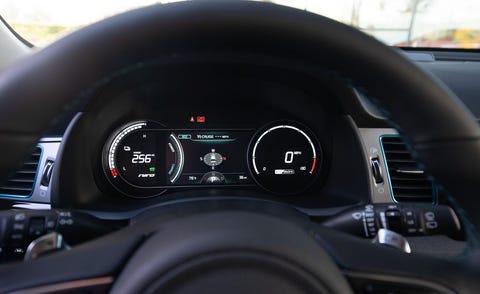
- Highs: Efficiently rated up to 52 mpg, affordable, practicality of a crossover.
- Lows: Some trims lack basic amenities, uninspiring performance, plug-in hybrid has limited EV range.
- Verdict: The Niro isn't our favorite car to drive, but it's perfect for drivers who care as much about fuel efficiency as they do about their budget.
Overview
The Toyota Prius has long been the car of choice for buyers in search of an affordable hybrid—but it's a segment that the handsome and practical 2020 Kia Niro ought to dominate instead. The Niro has several toes in the crossover
pool but maintains a manageable, compact footprint. It's also extremely
efficient, managing 52 mpg in the city in its hybrid variant and
delivering an EPA-rated 239 miles of electric range in EV form. Is it
quick? Not really. The best driver's car on the block? Also no. But with
your hard-earned money and perhaps a nagging climate conscience on the
line, it's a compelling choice.
What's New for 2020?
Kia
kept the changes light for the Niro's mid-cycle refresh, which so far
applies only to the hybrid and the plug-in but not to the electric
variety. Outside, the main changes are new headlights, a new
diamond-patterned grille, new LED running lights in a double-chevron
arrangement, and new 16- and 18-inch wheel designs. Inside, Kia has
updated the drive-mode graphics in the digital gauge cluster and made an
8.0-inch touchscreen infotainment system standard and a 10.3-inch unit
optional. We're most excited about the optional steering-wheel shift
paddles, which will also give the driver control over the intensity of
the Niro's regenerative braking.
Pricing and Which One to Buy
- FE: $24,000 (est.)
- LX: $25,000 (est.)
- EX: $27,000 (est.)
- Plug-in hybrid LX: $30,000 (est.)
- S Touring: 30,000 (est.)
- Touring: $34,000 (est.)
- EV: 38,000 (est.)
The
Niro hybrid is the best fit for us (and, we suspect, most drivers). It
offers excellent fuel economy with very few compromises, and it's also
pretty affordable. We'd choose the mid-level LX trim, which adds to the
Niro's spartan base offerings roof rails, a push-button start, rear LED
taillamps, and a folding armrest for the second row.
Engine, Transmission, and Performance
A
1.6-liter four-cylinder gasoline engine and an electric motor team up
with a six-speed dual-clutch automatic transmission in the non-hybrid
Niro. The system makes a total of 139 horsepower and motivated the Niro
FE from zero to 60 mph in 8.6 seconds
during our testing, placing it in the hunt with much of the
competition. The options-laden Touring model we tested, weighed down by
168 pounds of extra equipment, needed 9.6 seconds to complete the same
task. The Niro plug-in
uses the same basic powertrain as the hybrid model, albeit with a
larger battery pack for increased EV range. That battery adds up to 26
miles of EV operation, according to the EPA. We haven't tested the new
all-electric Niro EV, but it comes standard with DC fast-charging
capabilities that Kia claims can refill 80 percent of the battery in
just 75 minutes. The Niro easily tackles uneven roads, delivering a
controlled, stable ride. However, we noted an unusual level of impact
noise coming into the cabin when driving over bump-ridden roads.
Steering responses in the Niro are swift and accurate. The steering
features no dead zones, and the car tracks straight on the highway.
Steering effort, already firm, increases when Sport mode is engaged.
Range, Charging, and Battery Life
The
plug-in hybrid boasts a claimed electric-only range of 26 miles and the
all-electric model comes with a 64-kWh battery and up to 239 miles of
total range.
Fuel Economy and Real-World MPG
Kia improved
the Niro's aerodynamic efficiency for 2019 by fitting it with grille
shutters that close at around 35 mph to smooth airflow over the short
nose. The effort worked: The stripped-down FE's EPA-rated 52 mpg in the
city is just 2 mpg fewer than the more svelte Prius. Across the lineup,
the Niro performed worse at highway speeds than did the Prius; the FE
delivered 42 mpg in our 200-mile highway fuel-economy test while the
loaded Touring managed 39 mpg.
Interior, Comfort, and Cargo
The
base FE features a fuss-free interior that is heavy on plastic and
cloth. Partial-leather seat trim is standard starting with the EX. Also
standard across the lineup is two-zone automatic climate control, with
controls for the driver and front-seat passenger. There's even a button
to turn the passenger's climate control off if that seat is empty, which
could save energy in hot summer months when hybrids traditionally
forfeit efficiency due to the increased load from the air conditioner.
The Niro was designed from the outset to be a hybrid, not converted from
an existing gasoline-powered vehicle. As a result, cargo space is not
reduced by its battery pack. Unfortunately, the rear seats don't form a
flat load floor when folded, and other similarly sized crossovers can
accommodate more cargo. We managed to fit six carry-on suitcases behind
the rear seats and 18 with the rear seats folded.
Infotainment and Connectivity
Kia's
infotainment system uses a touchscreen supplemented by hard buttons.
The system is intuitive and simple, and Kia earns significant goodwill
by providing Apple CarPlay and Android Auto capability as standard. Base
Niros receive few infotainment baubles beyond smartphone connectivity
and SiriusXM compatibility. The optional navigation system uses GPS data
to predict energy demands, and will, for instance, save up energy in
the battery in anticipation of a hill climb.
Safety and Driver-Assistance Features
The
National Highway Traffic Safety Administration (NHTSA) hasn't tested a
Niro, but the Insurance Institute for Highway Safety (IIHS) has tested
both the hybrid and the plug-in hybrid models. The former earned a Top Safety Pick+ designation as did the latter despite headlamps that scored Poor in IIHS's testing. Kia's package of driver-assistance technology
is available starting with the LX by way of the Advanced Technology
package. Blind-spot monitoring and rear cross-traffic alert are standard
on the EX and up. Key safety features include:
- Available automated emergency braking
- Available blind-spot monitoring
- Available adaptive cruise control
Warranty and Maintenance Coverage
Kia and its sister company, Hyundai,
offer one of the most comprehensive vehicle warranties available. The
10-year powertrain warranty is the cornerstone, but Kia beats the
competition almost across the board. The only thing that's missing is
complimentary scheduled maintenance, offered in this class only by Chevrolet.
- Limited warranty covers 5 years or 60,000 miles
- Powertrain warranty covers 10 years or 100,000 miles
- Hybrid components are covered for 10 years or 100,000 miles
- No complimentary scheduled maintenance


